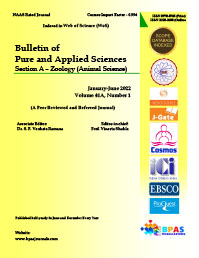Quantitative Analysis of Plankton in the Paddy Fields of Kakching District, Manipur
DOI:
https://doi.org/10.48165/bpas.2023.42A.2.4Keywords:
Biological, Physico-ChemicaL, Plankton, KakchingAbstract
The Plankton analysis along with physico-chemical characteristics of water was carried out on the four sampling sites in the paddy fields of Kakching District. Temperature, transparency, pH, dissolved oxygen, chloride, total alkalinity, acidity, hardness, nitrate and nitrite etc. were analysed and observed in favour on plankton in the paddy fields of the study areas. Phytoplankton recorded as increase during rainy season while decrease in zooplankton during the last part of October. Total 870 plankton, comprising 627 phytoplankton and 243 zooplankton were listed during the investigation period, July to October 2021.
Downloads
References
Affan A. Jewel. S.A, Haque,
Affan A. Jewel. S.A, Haque, M. Khan, S and Lee, J.B (2005). Seasonal cycle of
Seasonal cycle of
phytoplankton in Aquaculture ponds in
phytoplankton in Aquaculture ponds in Bangladesh, Algae 20, 43-52.
APHA (2005). Standard Methods for the Examination of Waste Water, Water Environment, Federation, Washington D.C.
Batt, L.R; Lacoun, P, Lekhal, H.D and Jha P.K. (1999). Physico chemical characteristics and plankton for Tanda Lake, Kathmandu, Poll. Res. 18, 353-258.
Das, J, Das SN Sahoo, R.K (1997). Semidiurnal variation of some physico chemical parameters in Mahanadi estuaries, East coast India. Indian Journal, Mar. Sc. 26(3), 322-326.
Devis, J.C (1975). Minimal dissolved oxygen requirements of aquatic life with emphasis on Canadan Species, Rev. J. Fish. Res. Board Canada 32(12), 2295-2332.
Govindaswamy, C., Kannan, L., Jayapaul, A (2000). Seasonal variation in physico chemical properties and primary production in coastal water biotopes of cormandal coast, India, J. Environ. Biol 21(1), 17.
Hedge and Bharthi (1985). Comparative phytoplankton ecology of fresh water ponds and lakes of Dharward Karnataka State (Ed. Adoni AD). India, Proc. National sysmposium pure and Applied Limnology, Bull. SOC. Sagar, 32, 24-29.
Hutchinson, G.E (1957). Concluding remarks, C.S.H. Symps. 22, 415-457. http//dx.doi.org./10.1101/SQB. 1957, 022.01.039.
Hwang, J. Kumar, R. Dahms, H., Tseng, L and Chen, Q. (2010). Interannual seasonal, and Dianual variations in vertical and
horizontal distribution patterns of 6 Oithonosps. (Copepoda; Cyclopoida) in the South China Sea, Zoological Studies, 49(2), 220-229..
ICMR, WHO (1985). Standard Methods for Examination Water.
Levinton. J.S (2001). Marine Biology Chapter 4, chemical and physical environment, Oxford Univ. Press, New York, 560p.
Morgan, A.M. Royer, T.V. David, M.B. Gentry. L.E (2006). Relationship among nutrients, chlorophyll-a and dissolved oxygen in agricultural streams in Illinois. J. Environ Qual 35, 1110-1117. http:/dx.doi.org/10.2134/Jeg. 2005. 0433.
Rajagopal, T. Thangamari, A and Archunan, G (2010). Comparison of physico-chemical parameters and plankton species diversity of two parrenial ponds in Sattur area, Tamil Nadu. J. Environ. Biol. 31, 78-79.
Singh. N (2008). Assessment of Water Quality of Khuga River, Manipur, JETIR. 5(12), 376- 381.
Sukumaran, P.K. (1989). Observations on ecology plankton in fresh water tank in Bangalore University (unpublished).
Vaishali Somani, Milan Gholba and Madhuri Pejaver (2007). Study of phytoplankton in the lake of Masunda, Thane, employing multivariate analysis, Eco. Environ, and Cons. 13, 9847-9848.
Ward, H.B. and Whipple, G.C. (1959). Fresh water Biology, Ed. W.T. Edmonson University of Washington.
